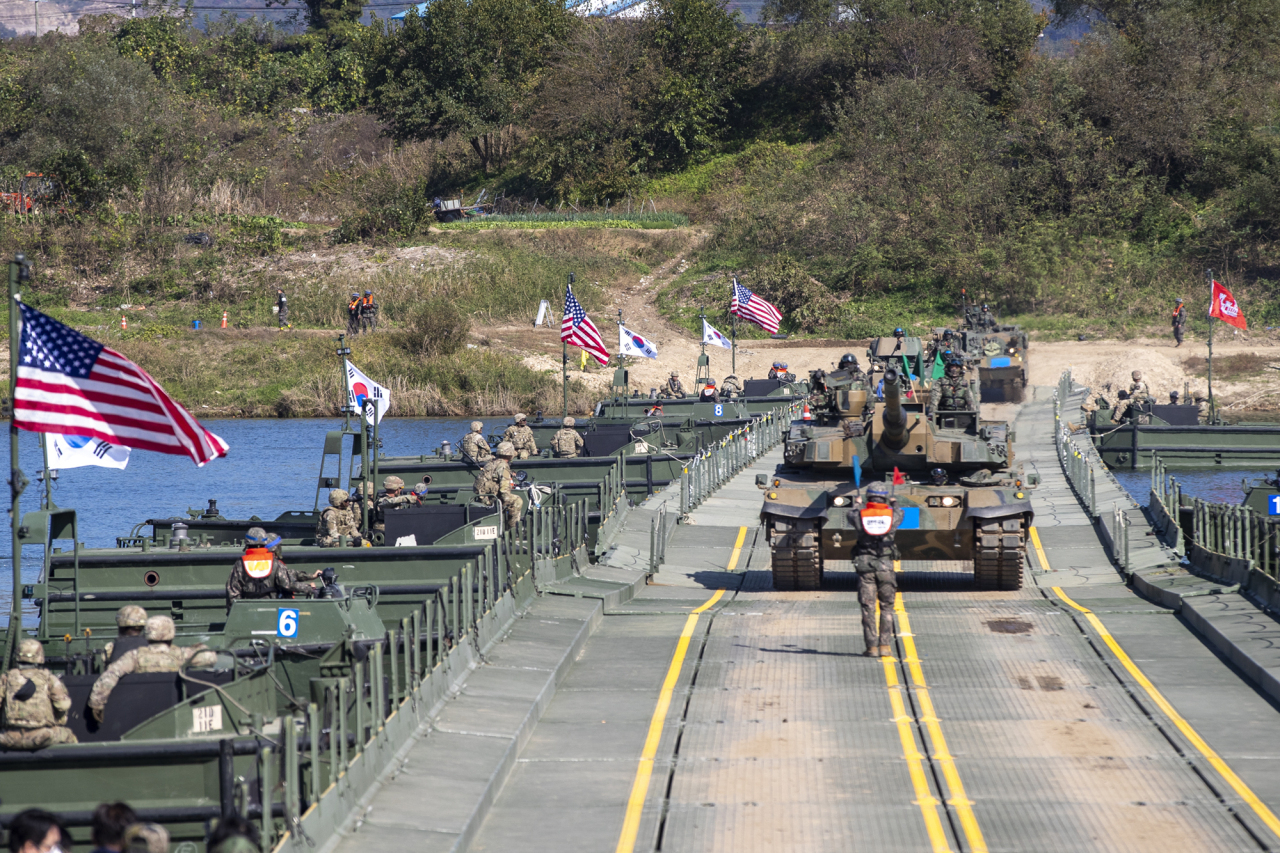 |
South Korean and US soldiers conduct joint drills in Yeoju, Gyeonggi Province on Oct. 19, 2022. (Ministry of National Defense) |
The Yoon Suk Yeol administration is preparing for joint forums and military exercises starting next month to commemorate 70 years of relations with the US, as South Korea looks to cement ties with its biggest ally to counter North Korea’s nuclear threats and a more assertive China.
Seoul-Washington ties date back to October 1953, when they signed a mutual defense treaty following the end of the 1950-53 Korean War. The two Koreas are still technically at war, having signed a cease-fire but not a formal peace treaty.
A conservative leader who wants closer ties with the US and Japan, President Yoon is seeking a stronger three-way coalition of the three for North Korea’s denuclearization. Seoul and Tokyo are currently taking part in a Washington-led chip partnership meant to sideline Beijing -- a US rival that is taking aim at Washington, politically and economically.
In a show of unity, the Yoon administration will back a push for a joint forum bringing together South Korean and American academics in mid-April in the US -- just before Yoon’s state visit there in the same month -- to deepen ties. The visit, the first in 12 years, is expected to flesh out concrete steps to deliver the “alliance in action,” a motto Seoul uses to describe a united coalition with common interests from security to trade.
In June, South Korea and the US will hold their largest live-fire exercises to rein in North Korea’s aggression, the latest of which took place over the weekend when the North simulated a nuclear attack on Seoul and Washington by launching a ballistic missile equipped with a mock nuclear warhead. Pyongyang has long defied United Nations sanctions banning ballistic missile tests.
Improving “deterrence capabilities” is what the two allies are after, South Korea’s military said Wednesday in a statement. The two resumed full-scale military drills this month as part of solidifying the US commitment to using its full range of weapons including nuclear arsenal, to deter and respond to attacks on its allies. A day ago, Seoul announced sanctions banning items linked to Pyongyang’s satellite development, which analysts suspect is a cover for missile launches.
For the first time, the South Korean and US defense chiefs will cohost a meeting in October with their counterparts at the United Nations Command, which handles affairs involving the Demilitarized Zone. The meeting will be part of a larger annual gathering on security, known as the Security Consultative Meeting. The gathering, which will take place in Seoul after being held in Washington the previous year, aims to enhance readiness.
In November, the Ministry of Patriots and Veterans Affairs in Seoul will hold events to recognize the sacrifices veterans made during the Korean War. The ministry will also reach out to countries that had sent aid -- troops or medical supplies -- to help South Korea fight back North Korea’s invasion, backed by China.
The cease-fire, signed on July 27, 1953, will be commemorated in July, the ministry added, noting the South Korean veterans minister will meet with his counterparts from those countries that had supported Seoul to reaffirm commitment to peace.
Events aimed at expanding Seoul-Washington business ties will take place as well. By no later than June, a roundtable to be cohosted by the Foreign Ministry and the American Chamber of Commerce in Seoul will review how the private sector can help reach more economic goals the countries have so far achieved together. Later in the year, Foreign Minister Park Jin and his US counterpart will gather the input from the private sector over sharing technological advances.
Meanwhile, a joint space forum to take place by year-end will build on Park’s trip to the US a month earlier. There, the top South Korean diplomat said he expects space ties to take their alliance to the next level at a meeting with the chief of NASA, the main agency leading US space exploration.






![[Today’s K-pop] Blackpink’s Jennie, Lisa invited to Coachella as solo acts](http://res.heraldm.com/phpwas/restmb_idxmake.php?idx=644&simg=/content/image/2024/11/21/20241121050099_0.jpg)
